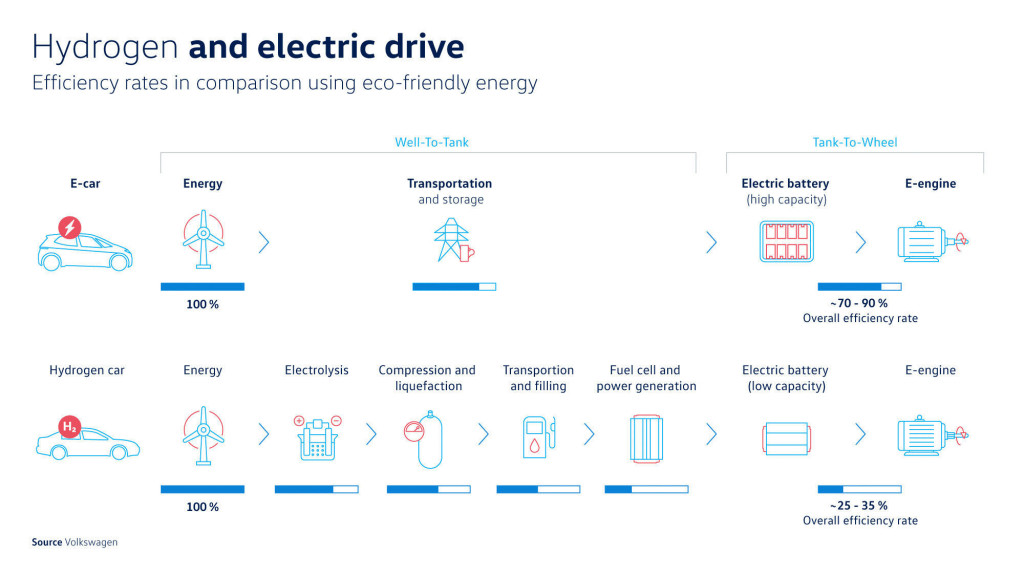Most major automakers are actively working to reduce emissions, but they are not in agreement on how to do that. Some prefer battery-electric vehicles, while others champion hydrogen fuel cells as the superior zero-emission technology.
Volkswagen has come down firmly on the side of batteries, and it explained why in a recent, well-illustrated press release. Put simply, batteries are far more efficient than fuel cells, according to VW.
Both vehicles types use electricity for propulsion. Battery-electric cars store that electricity directly in their battery packs, while fuel-cell cars store it in gaseous hydrogen, releasing it through a chemical reaction in the cells.
The automaker cited a study by management consultancy Horváth & Partners, which found that battery-electric cars have an efficiency of 70% to 80%. That means about three quarters of the electricity generated by the grid is actually applied to propulsion.

Hydrogen vs electric - Volkswagen
About 8% of a given amount of electricity is lost in transmission from the source to the car's battery pack, while 18% of what remains is lost between the battery pack and the drive wheels, according to the study.
In contrast, only about 25% to 35% of energy actually makes it to the wheels of a fuel-cell car, according to the study.
That's because of the immense amount of energy needed to produce hydrogen through electrolysis, the most common current method, according to the study. Only 55%of that energy is represented by usable hydrogen, the study said.
The process of converting hydrogen into electricity within a fuel cell is also inherently inefficient, according to the study. Of the remaining potential energy, an additional 55% is lost in that process, the study said.
Proponents of fuel-cell cars have pointed out advantages, including quick refueling times of just a few minutes, and long range. All three fuel-cell cars currently sold in the United States offer more than 300 miles of range, something that can only be said of a handful of Tesla battery-electric cars.
But Volkswagen believes battery-electric cars will soon be able to match the range of fuel-cell models. The automaker also believes cars powered by batteries will have lower overall ownership costs than fuel-cell cars.
Not every automaker agrees, however.
Honda, Hyundai, and Toyota remain staunch advocates of fuel cells. Each currently sells a fuel-cell vehicle in the U.S., albeit only in California due to lack of fueling infrastructure elsewhere. Honda and Toyota don't even offer battery-electric models in the U.S.

Hyundai Nexo
In contrast to VW's predictions, Toyota is likely expecting the price of fuel-cell powertrains to drop as production volumes increase. The company is also looking at other applications beyond passenger cars, such as commercial trucks.
Similarly, Hyundai is looking at a bigger picture than just cars, and expects economic factors to eventually swing in favor of hydrogen.
Honda just partnered with Isuzu on fuel-cell development, indicating the Japanese automaker is also thinking about commercial vehicles. Isuzu previously sold passenger cars in the U.S., but commercial trucks now make up the majority of its business.
Frank Klose, co-author of the study cited by VW, agrees with the direction that most automakers seem to be taking—in the direction of commercial vehicles, if at all. He said hydrogen has a future, just not in cars. Other applications, such as "heavy-duty transport, aviation, and shipping" will be a better fit, he said.












